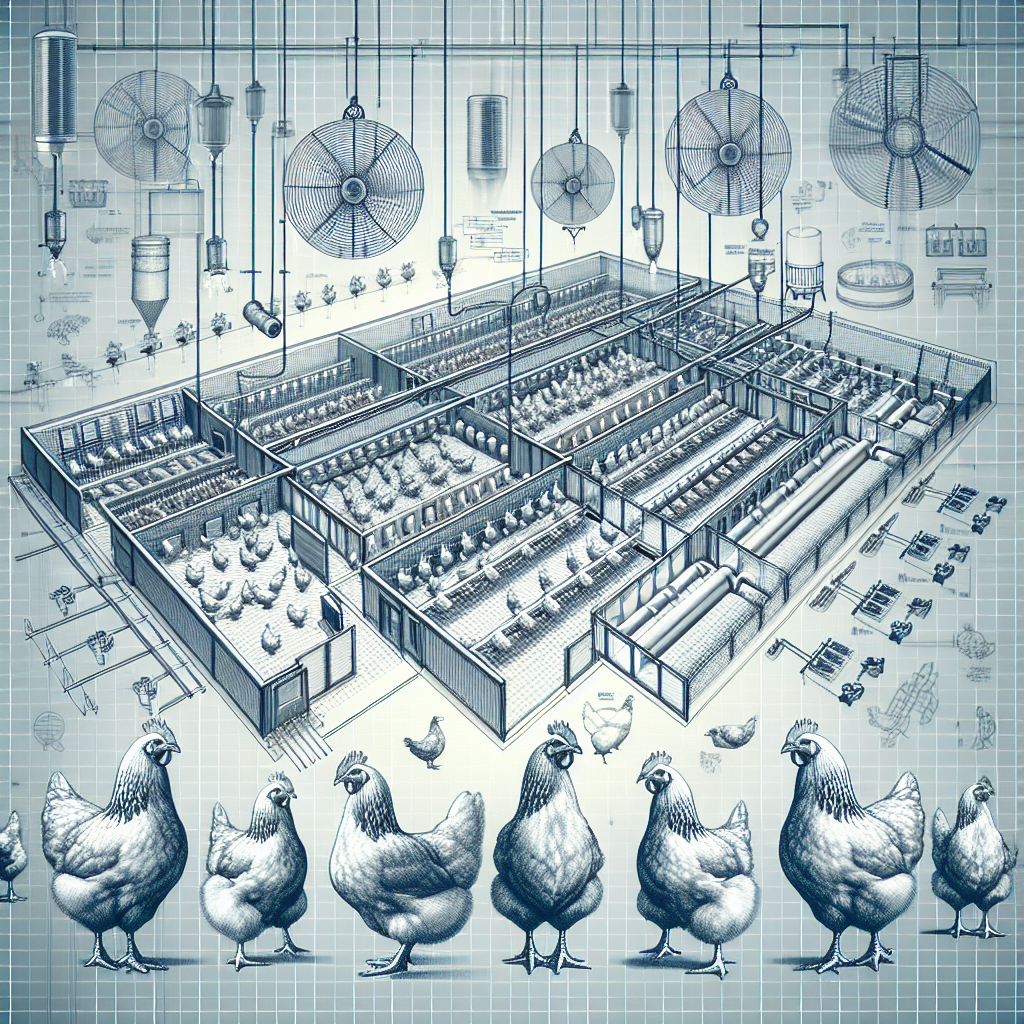In order to achieve uniform growth and development in larger flocks, there are several key considerations to keep in mind. From providing proper nutrition and managing space effectively, to implementing a regular health monitoring program, there are numerous steps you can take to ensure that your flock grows and develops in a consistent and healthy manner. By prioritizing their well-being and attending to their individual needs, you can create a successful environment that supports the uniform growth and development of your flock.
Maintaining a Balanced Diet
Ensuring that your flock receives a balanced diet is crucial for their overall health and well-being. A balanced diet will provide the necessary nutrients, vitamins, and minerals to support growth and development, as well as maintain optimal egg production in layers. It is essential to provide a variety of feed options, including grains, protein sources, and fresh greens to meet the nutritional needs of the birds.
Providing Adequate Nutrition
To provide adequate nutrition, it is essential to offer a complete and balanced feed formulated specifically for poultry. This feed should contain the proper balance of protein, carbohydrates, fats, vitamins, and minerals. Additionally, you can supplement their diet with table scraps, kitchen leftovers, or treats such as mealworms or greens to promote a varied diet.
Considering the Nutritional Requirements of Different Age Groups
Different age groups of poultry have varying nutritional requirements. Chicks require a high-protein starter feed to support their rapid growth, while growing pullets and layers have specific nutrient needs to promote optimal egg production. Understanding the nutritional requirements of each age group and providing appropriate feed will ensure proper growth and development.
Ensuring Sufficient Access to Feed and Water
Proper feeding and watering systems are essential in maintaining a balanced diet for your flock. Ensure that all birds have easy access to clean water at all times, preferably through automatic watering systems or multiple water sources. Additionally, provide adequate feeders to prevent overcrowding and allow easy access to feed for all birds.
Implementing Proper Housing and Space Management
Providing suitable housing and managing space effectively play a crucial role in the overall well-being and productivity of your flock. This includes ensuring sufficient space for flock growth, proper ventilation and temperature control, and preventing overcrowding.
Providing Sufficient Space for Flock Growth
Allowing enough space for your flock to grow and move freely is vital for their health and welfare. Overcrowding can lead to stress, aggression, and the spread of diseases among the birds. Ensure each bird has enough room to move, stretch their wings, and engage in natural behaviors.
Ensuring Proper Ventilation and Temperature Control
Proper ventilation in poultry housing is essential to remove excess heat, moisture, and harmful gases, such as ammonia. Adjustable ventilation systems, windows, or vents can help regulate the temperature and air quality within the coop. Maintaining a comfortable temperature range will prevent heat stress or cold stress, depending on the climate.
Preventing Overcrowding and Promoting Bird Welfare
Overcrowding can lead to numerous issues, such as increased aggression, spread of diseases, and decreased productivity. It is crucial to keep the stocking density within recommended guidelines. Allow enough space for each bird to have access to food, water, and sufficient resting areas. This will promote bird welfare and reduce the incidence of injuries or stress-related problems.
Managing Biosecurity
Implementing strict biosecurity measures is essential to protect your flock from diseases and maintain their health. This includes following disease prevention protocols, properly isolating new birds, and regularly monitoring for health issues.
Implementing Strict Disease Prevention Protocols
Biosecurity measures should include practices such as limiting entry to the farm, sanitizing equipment and vehicles, and providing foot baths or boot covers for visitors. Ensuring strict hygiene practices and implementing disease prevention protocols will help minimize the risk of introducing diseases to your flock.
Properly Isolating New Birds
When introducing new birds to your flock, it is crucial to quarantine them for a period to monitor their health and prevent the spread of potential diseases. Keep them in a separate area with no direct contact with the existing flock, and closely monitor their condition during this isolation period.
Regularly Monitoring for Health Issues
Regularly monitoring the health of your flock is important to identify any potential health issues early. This includes observing their behavior, checking for signs of disease, and performing routine health checks. If you notice any abnormalities or signs of illness, consult with a poultry veterinarian for diagnosis and appropriate treatment.
Implementing Proper Breeding Practices
Proper breeding practices are vital for maintaining the health and productivity of your flock. This includes selecting suitable breeding stock, monitoring fertility and egg production, and ensuring proper incubation and brooding procedures.
Selecting Suitable Breeding Stock
Choosing healthy and genetically sound breeding stock is crucial for producing offspring with desirable traits. Select birds that exhibit good overall health, robustness, and desired productivity traits. Regularly evaluate the breeding stock and consider culling birds that do not meet the desired standards.
Monitoring Fertility and Egg Production
Monitoring the fertility and egg production rates of your breeding flock will help ensure successful reproduction. Regularly collect and evaluate eggs for fertility, hatchability, and eggshell quality. If necessary, consult with a poultry expert to address any reproductive issues or implement breeding strategies to optimize production.
Ensuring Proper Incubation and Brooding Procedures
Providing the right conditions during incubation and brooding is vital for the healthy development of chicks. Maintain proper temperature, humidity, and ventilation throughout the incubation process. After hatching, ensure a clean and comfortable brooder environment with adequate heat, feed, and water to support the chicks’ early growth and development.
Developing a Vaccination Program
Implementing a vaccination program is a crucial aspect of flock health management. Consult with a poultry veterinarian to develop a tailored vaccination program based on your flock’s specific needs and potential disease risks.
Consulting with a Poultry Veterinarian
Working with a poultry veterinarian who specializes in poultry health can provide valuable guidance in developing a vaccination program. They can assess the disease risks in your specific area and customize a vaccination schedule accordingly.
Evaluating the Risks and Benefits of Different Vaccines
Different vaccines are available for various poultry diseases. Evaluate the risks and benefits of each vaccine to determine which ones are most appropriate for your flock. Consider the disease prevalence, effectiveness of the vaccine, and potential side effects when making vaccination decisions.
Formulating an Effective Vaccination Schedule
Creating a proper vaccination schedule is essential for maximizing the effectiveness of vaccines and protecting your flock from diseases. Work with your poultry veterinarian to establish a comprehensive vaccination schedule, including the appropriate timing and dosage for each vaccine.
Implementing Effective Parasite Control
Parasite control is vital to prevent and manage common parasites that can affect your flock. By recognizing and treating parasites, establishing preventive measures, and conducting regular health checks, you can ensure the well-being of your poultry.
Recognizing and Treating Common Parasites
Common poultry parasites include mites, lice, and worms. Regularly monitor your flock for signs of infestation, such as feather loss, irritability, or reduced egg production. Treat affected birds promptly using approved parasiticides and follow recommended protocols to eliminate the parasites effectively.
Establishing Preventive Measures
Prevention is key when it comes to managing parasites. Implement preventive measures such as regular cleaning and disinfection of the coop, providing clean bedding, and avoiding overcrowding. Additionally, practice rotational pasture management and maintain good hygiene practices to minimize the risk of parasites.
Regularly Conducting Health Checks
Regularly performing health checks on your flock will help identify any signs of infestation or disease early. Inspect birds for external parasites, check their feces for signs of worms, and observe their overall behavior and appearance. If you notice any abnormalities or suspect an infestation, consult with a poultry professional for appropriate treatment.
Promoting Optimal Environmental Conditions
Creating optimal environmental conditions in your poultry housing is vital for the comfort and productivity of your flock. This includes maintaining proper lighting, providing adequate litter and bedding, and creating suitable nesting areas.
Maintaining Proper Lighting
Proper lighting is essential for the overall health and productivity of your flock. Ensure that your poultry housing has a lighting system that provides enough light to promote normal activity and egg production. Control the lighting duration and intensity to simulate natural daylight cycles and promote proper biological function in your birds.
Providing Adequate Litter and Bedding
Clean and comfortable litter or bedding is important for the welfare of your flock. Choose a suitable material, such as wood shavings or straw, and regularly replace soiled or wet bedding. Adequate litter depth will help absorb moisture, prevent footpad issues, and improve overall hygiene within the coop.
Creating Suitable Nesting Areas
Providing suitable nesting areas is important for the well-being of your laying hens. The nesting areas should be clean, dark, and private to encourage natural egg-laying behavior. Ensure that each bird has access to a sufficient number of nesting boxes and provide soft nesting material, such as straw or shavings, to create a comfortable space for egg-laying.
Managing Social Interactions and Pecking Order
Promoting positive social interactions among your flock is essential for their welfare and productivity. By avoiding mixing different age groups too early, providing sufficient perches and roosting space, and monitoring aggressive behavior, you can maintain a harmonious flock dynamic.
Avoiding Mixing Different Age Groups Too Early
Younger and older birds have different social dynamics and may not easily integrate. Avoid introducing younger birds to an established flock too early, as this can lead to aggression and pecking. Gradual integration through a barrier or introduction to neutral territory can help minimize stress and promote successful socialization.
Providing Sufficient Perches and Roosting Space
Birds have a natural instinct to perch and roost, especially during the night. Ensure that your poultry housing has enough perches and roosting space to accommodate all birds comfortably. This will prevent overcrowding on perches, reduce aggression, and promote restful sleep for your flock.
Monitoring Aggressive Behavior
Regularly monitor your flock for any signs of aggression or bullying. This can include excessive pecking, feather plucking, or injury. If aggressive behavior is observed, consider removing the aggressive bird temporarily or providing additional enrichment, such as environmental distractions or extra feeders, to help alleviate tension among the flock.
Ensuring Proper Hygiene and Sanitation
Maintaining proper hygiene and sanitation practices within your poultry housing is essential for preventing the spread of diseases and ensuring the overall health of your flock.
Implementing Regular Cleaning and Disinfection
Regularly clean and disinfect your poultry housing to eliminate pathogens and minimize the risk of disease transmission. Remove soiled bedding, feces, and any other organic matter from the coop. Use appropriate disinfectants and follow recommended protocols to ensure effective sanitation.
Properly Managing Manure and Waste
Proper management of manure and waste is crucial for maintaining a clean and healthy environment for your flock. Regularly remove accumulated manure from the coop and dispose of it properly. Consider implementing a manure management system, such as composting, to reduce odor, flies, and the risk of disease.
Implementing Rodent and Pest Control
Rodents and pests can contaminate feed, spread diseases, and cause stress to your flock. Implementing effective rodent and pest control measures is essential to prevent infestations. Seal any potential entry points, use traps or baits as needed, and regularly monitor for signs of infestation. Consult with a pest control professional if necessary.
Regularly Monitoring Growth and Development
Regularly monitoring the growth and development of your flock will allow you to assess their overall health, identify any growth discrepancies, and seek expert assessment and guidance if needed.
Recording Key Growth Metrics
Establish a system for recording key growth metrics, such as weight, size, or egg production, at regular intervals. Keeping track of these metrics will enable you to identify trends and deviations from normal growth patterns.
Identifying and Addressing Growth Discrepancies
If you notice any growth discrepancies or abnormalities, it is essential to investigate and address the issue promptly. Seek advice from poultry experts or veterinarians to determine the underlying cause and take appropriate actions, such as adjusting nutrition or implementing treatment plans.
Consulting with Poultry Experts for Assessment and Guidance
Regularly consult with poultry experts or veterinarians who specialize in poultry health and management. They can provide professional assessment, guidance, and recommendations based on their expertise and knowledge. Seeking their advice will help ensure the optimal growth and development of your flock.
In conclusion, ensuring uniform growth and development in larger flocks requires a comprehensive approach that addresses multiple aspects of poultry care. By maintaining a balanced diet, providing proper housing and space management, implementing biosecurity measures, practicing proper breeding practices, developing a vaccination program, implementing effective parasite control, promoting optimal environmental conditions, managing social interactions and pecking order, ensuring proper hygiene and sanitation, and regularly monitoring growth and development, you can create a healthy and thriving flock. Remember to consult with poultry experts and veterinarians for professional guidance and to address specific needs and concerns unique to your flock.




